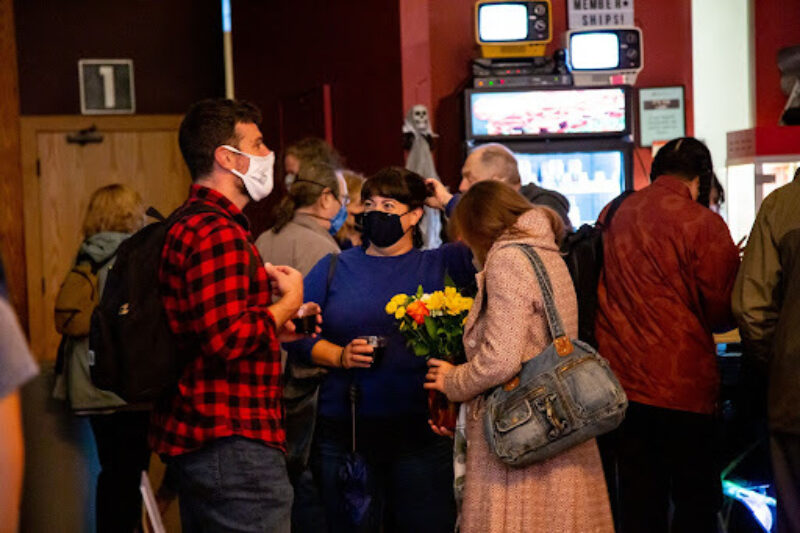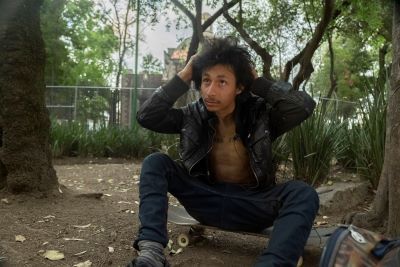Film as a Medium for Change at Local Sightings Film Festival
Review of Local Sightings Film Festival presented by Northwest Film Forum
Written by Teen Writer Stella Crouch and edited by Teen Editorial Staff

The Local Sightings Film Festival is continuing to thrive in its 24th year. It is the only film festival in Seattle dedicated to Pacific Northwest films. The Northwest Film Forum was founded in 1995. It has kept Seattle’s film culture alive through its countless festivals, even through the ongoing COVID-19 pandemic. Last year, the Local Sightings Film Festival was held entirely online and now this year’s has been held hybrid, showing films both in person and in a virtual, COVID-safe manner. This year's festival has shown a wide array of genres and narratives with their only commonality being their connection to the Pacific Northwest. Regardless of their many differences they all feel as though they belong and there is something for everyone to appreciate.
Occupying the Megalopolis
Occupying the Megalopolis is a feature directed by Jefferson Elliott that takes on a multitude of societal issues with a diverse cast, which all culminate under the concept of space, how it is used, and who gets to access it. The cast is made up of street artists, political protesters, indigenous people, and homeless people who all reside in Mexico City. The term “megalopolis” is generally considered to have been coined by Patrick Geddes in his 1915 book Cities in Evolution. After the Mexican revolution, the population of Mexico City skyrocketed. Now Mexico City stands as the fifth-largest city in the world.
Occupying the Megalopolis has a sense of allowing its cast to drive the narrative of the film. The film blends personal stories with facts (such as the 11 women that are killed every day in Mexico as part of a large crisis of femicide). You are forced to think about the question: Who is time and time again failed by their government and why? Rather than acknowledging the existence of oppressive structures such as racism, sexism, queerphobia, and ableism, it's a bitterly ironic societal norm to blame the victims of these systems instead. The film also provides an insight into the intersections of organizing for justice in Mexico City and examines the hierarchy of who gets the privilege of space in a densely populated city. The title of the film itself invites the viewer to question who is occupying that space and why. What space are you occupying?

That Piece of You
A part of the series “Nail Biters,” which are short thrillers utilizing eerie music and drama to create a noir aura around each storyline, That Piece of You is directed by Jessica Barr. The story follows Trisha as she is breaking into her old house with her girlfriend Maddie. At first, it is unclear what prompted them to sneak into Trisha’s old home. They treat the house like Trisha never left, laying on the bed together seemingly with comfort until they hear the new tenants approaching. Trisha and Maddie take cover in the bedroom closet. With the new owner and his girlfriend’s arrival, we begin to receive clues as to the couple’s motives for re-entering a space that is no longer Trisha’s.
While the two are hiding, viewers experience two parallel stories. The dialogue flips between the new owner and his girlfriend and the couple in the closet. It quickly becomes apparent that the girlfriend and the owner are intoxicated, rendering their dialogue almost entirely irrelevant to Maddie and Trisha. This allows for the narrative to re-focus on Maddie and Trisha. We begin to see that Maddie is not completely sure why they are there and how that is impacting their relationship. Maddie is overwhelmed by the sudden influx of new information she is gathering about Trisha and her family's past. The more Trisha opens up however, the more comfortable Maddie seems. As the film progresses it makes the viewer question why they revisit spaces both mentally and physically and to whose benefit.
Spring Tide
Spring Tide, directed by Jean Parsons, is another film in the “Nail Biters'' series. The film opens with Emily, a young woman excited for her best friend to stay with her in a seaside vacation town, anticipating some time alone with her friend. Immediately you see how the characters contrast in their physical appearance, personality, and different appetites for risk—and how that can shake their friendship to its core. Emily’s friend is looking for weed and takes her shirt off, exposing her bikini top in hopes of enticing two men down on the beach into giving them weed. Emily is visibly uncomfortable with this plan, eventually convincing her friend that it isn’t worth it. When they go back to the resort they get into the pool. Emily wears a plain one piece whereas her friend wears a bright bikini. While they are in the pool area they notice an older man looking at them. Emily clearly doesn’t like this man's eyes on them but her friend seemed to enjoy the attention.
While watching, the viewer might think this can’t possibly be another teenage summer rite of passage film but it continues to be for the time being. Spring Tide is the type of film you might find yourself talking to, imploring the characters to make different choices.
When a man who worked at the resort comes into the story he only re-enforces the viewer’s worries about the trajectory of the film by being overly flirtatious and pushy with Emily. When Emily’s friend asks him for weed they end up spending time together. The story puts a clever twist on what is often a traditional plot line: a girl viewed as “unattractive” gets with a boy who is seen as more attractive and experienced only to have her heart broken or be used by him.
Despite the setting of the film being in a rural resort, a seemingly bland environment, the film grapples with consent, friendship, peer pressure, and deception. The characters bring little backstory, allowing the viewer to fill in more details about the girls' relationship and history.
Perhaps more of the aftermath of the main event could have been added to the story at the end while still leaving the same questions intact. The film seems to end abruptly and we don’t get to see much of the characters' reactions after the surprising turn of events. Stereotypes are challenged and power dynamics are reexamined and the end leaves you questioning your own assumptions you made about the characters and the world at large.
Despite two of the three films being in the same series, the three films are quite different. They all deal with modern issues but vary in length, location, age of participants, and backgrounds, and elicit different responses. They do however share a commonality. They all have an underlying message of needing to work together to solve the modern crisis in an ever changing world. The Local Sightings Film Festival showcases works that deal with everything from consent, to poverty, to capitalism, to violence, and implores you to fight for your rights and the rights of others in the most collaborative way possible.
The Local Sightings Film Festival was produced by the Northwest Film Forum and ran September 16-26, 2021. For more information see here.
Lead photo credit: NWFF Lobby. Courtesy of Derek Edamura.
The TeenTix Newsroom is a group of teen writers led by the Teen Editorial Staff. For each review, Newsroom writers work individually with a teen editor to polish their writing for publication. The Teen Editorial Staff is made up of 6 teens who curate the review portion of the TeenTix blog. More information about the Teen Editorial Staff can be found HERE.
The TeenTix Press Corps promotes critical thinking, communication, and information literacy through criticism and journalism practice for teens. For more information about the Press Corps program see HERE


